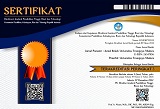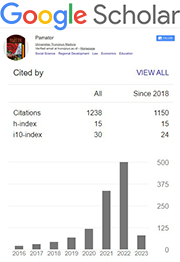Metafor Kerapan Sapi dalam Tata Kelola Perusahaan dari Sudut Pandang Teori Stewardship
Abstract
This study aims to explain how kerapan sapi culture can describe corporate governance from the point of view of stewardship theory. Stewardship theory states that managers will carry out their duties and responsibilities in the interests of the organization and shareholders. In this theory, the manager will put aside his personal interests. Kerapan sapi is a Madurese culture that competes for the running speed of a pair of cows using pangonong and kaleles as a place for the tokang tongko' to stand to control the cows. Tokang tongko' is a party that has an important role in creating an effective and efficient running speed of Sapi Kerap in order to become a winner, just like a company manager who is the authorized party to manage the company effectively and efficiently in order to be able to compete with competitors. Tokang tongko' is assumed to have a trustworthy, honest, and responsible nature for the trust that has been given by the owner of the cow, which is often in accordance with the theory of stewardship. Tokang tongko' will take actions in accordance with the interests of sapi kerap owners, like a manager who carries out his duties and responsibilities in the interests of shareholders.
Keywords
Full Text:
PDF (Bahasa Indonesia)References
Astutik, K. F., & Sarmini. (2014). Budaya Kerapan Sapi sebagai Modal Sosial Masyarakat Madura di Kecamatan Sepulu Kabupaten Bangkalan. Kajian Moral dan Kewarganegaraan, 3(1), 324-342.
Chinn, R. (2000). Corporate Governance Handbook: Gee Publishing Ltd. London.
Donaldson, L., & Davis, J. H. (1991). Stewardship theory or agency theory: CEO governance and shareholder returns. Australian Journal of management, 16(1), 49-64.
Eisenhardt, K. M. (1989). Agency Theory: An Assessment and Review. The Academy of Management Review, 14(1), 57-74.
Hasan, F. (2012). Damapk Sosial Ekonomi Pergeseran Nilai Budaya Karapan Sapi. Pamator, 5(2), 96-103.
Jensen, M. C., & Meckling, W. H. (1976). Theory of The Firm: Managerial Behavior, Agency Costs and Ownership Structure. Journal of Financial Economics 3, 305-360.
Juhari, I. B. (2016). Ekonomi dan Prestise dalam Budaya Kerapan Sapi di Madura. Karsa: Journal of Social and Islamic Culture, 24(2), 186-204.
KNKG. (2006). Pedoman Umum Good Corporate Governance Indonesia. Jakarta: Komite Nasional Kebijakan Governance.
Kosim, M. K. M. (2012). Kerapan sapi;“Pesta” rakyat Madura (perspektif historis-normatif). Karsa: Journal of Social and Islamic Culture, 11(1), 68-76.
Nurhayati, A. (2012). Revisiting Pariwisata Madura; Studi Kebijakan Pembangunan Kepariwistaan Kabupaten Sampang. Karsa: Journal of Social and Islamic Culture, 18(2), 182-192.
Suri, S., & Hadad, M. D. (2014). The Indonesia Corporate Governance Manual First Edition. Jakarta: International Finance Corporation
DOI: https://doi.org/10.21107/pamator.v14i2.10801
Refbacks
- There are currently no refbacks.
Copyright (c) 2021 Moh. Baqir Ainun

This work is licensed under a Creative Commons Attribution-ShareAlike 4.0 International License.
Jurnal Pamator : Jurnal Ilmiah Universitas Trunojoyo by Universitas Trunojoyo Madura is licensed under a Creative Commons Attribution-ShareAlike 4.0 International License.















.png)